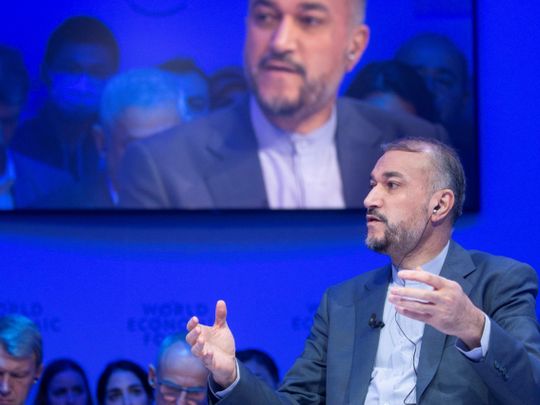
Davos: Iran’s foreign minister said US President Joe Biden has to end his predecessor’s “maximum pressure” strategy against Tehran and guarantee it economic relief from sanctions if he wants to restore the 2015 nuclear deal.
The remarks came a day after a top US official said time was short to reach an agreement to revive the pact.
Addressing the World Economic Forum in Davos on Thursday, Hossein Amirabdollahian said that a window for diplomacy with the US remained open and that Iran is serious about reaching a durable agreement with Washington.
Talks to revive the landmark accord, which removed many sanctions on Iran in exchange for limits on its nuclear activities until the Trump administration left the pact in 2018 and reimposed penalties, remain stalled.
Iran wants the US to reverse a 2019 Trump administration decision to list Iran’s Islamic Revolutionary Guard Corps as a terrorist organisation, a politically fraught decision for Biden ahead of this year’s midterm elections.
Diplomats have failed to resolve the impasse and negotiate an end to the US penalties that have heavily restricted Opec-member Iran’s exports of oil.
In testimony to the Senate Foreign Relations Committee on Wednesday, US Special Envoy to Iran Robert Malley said that a return to the multinational Joint Comprehensive Plan of Action, as the 2015 deal is also known, would help keep a lid on Iranian nuclear activity that accelerated after President Donald Trump’s decision to pull out.
Time is running out
But Malley made clear that time is running out after more than a year of start-and-stop talks in Vienna appears to have lost momentum.
Since the US quit the accord, Tehran has gone beyond agreed-to limits on nuclear enrichment and, according to Malley and other experts, may be only weeks or months away from accumulating the fuel needed to build a nuclear weapon if that decision is made.
Iranian officials have repeatedly said their nuclear programme is peaceful and not designed to build a weapon.
Iran says the IRGC designation was part of the Trump government’s strategy to topple the Islamic Republic’s economy and prevent a future accord.
The US, however, insists the listing isn’t related to Iran’s atomic program and therefore falls outside the original remit of the nuclear pact. Removing the designation is highly unpopular with US lawmakers across the aisle.
Amirabdollahian said there was no tangible difference between the Iran policies of Biden and Trump and the latter’s strategy must be reversed. He didn’t say explicitly whether that had to include the removal of the IRGC terrorism designation.
“The most important issue is that Iran’s economic sanctions are effectively removed and that Trump’s maximum pressure policies are lifted,” he said. “The Americans know very well what the realities are on the ground and what they need to do. We’ve left the window of diplomacy open and we are serious about reaching a lasting agreement.”
The minister also accused Israel of “holding US foreign policy hostage” by “inflating” the significance of the IRGC terrorism listing to block the restoration of the deal and any consequent economic benefits for Iran.












